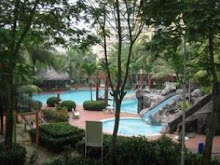When it comes to food hunting in Melaka, the journey is never considered complete without Hainanese chicken rice ball. Personally, I prefer the Hainanese chicken rice at Kedai Kopi Chung Wah .
The Chung Wah chicken rice is not only popular among the local residents, but especially favorable by tourists as well. In fact, Chung Wah kopitiam (a popular word in Malaysia to describe a typical Hainanese coffee shop) is one of the earliest pioneers in Melaka to offer rice balls.
Chung Wah kopitiam occupies a relatively small business space, and food lovers often need to queue up during public holidays before securing a table. The interior is nothing fancy, but clean and neat. The wooden chair and stone-surfaced table which are typically seen in Chinese families during the olden days, are used in Chung Wah kopitiam to complement your meal.
A Simple Meal of Chicken and Rice Balls
Ordering at Chung Wah is simple; just tell the attendant the total number of people eating, and you’ll be served. Unless requested otherwise, each table is served with 5 rice balls per individual, and a plate of white chicken to be shared. If you are like me, of whom 5 rice balls are not sufficient, you can of course make an additional order.
The rice ball at Chung Wah is smooth and solid. If you use a chopstick to split the rice ball, the halves will still be staying intact in a solid structure, instead of scattering around as seen in some other places.
This is a plate of chicken for two. It’s tender and sufficiently oiled. Sorry but you should never expect roasted or stock chicken in a purely traditional Hainanese chicken rice shop. Some people prefer roasted chicken as they had “bad encounter” with white chicken. But believe me, the white chicken at Chung Wah is so good that, you will never bother to ask for roasted chicken here. Personally, I seldom enjoy white chicken as well, but this one at Chung Wah is good.
Though the white chicken and rice ball are good, but personally I think Chung Wah should be more generous with cucumber. In a plate of white chicken as shown above, there were only 2 pieces of cucumber covered at the bottom.
Where is Chung Wah Kopitiam?Geographically specified, Chung Wah kopitiam is located at Lorong Hang Jebat. However, not many people know about the road name. The location can be alternatively described as follows:
Opposite OCBC Bank
At the corner of Tan Boon Seng Bridge
Visibly seen at the beginning of
Jonker Street2 minutes walking distance from Hoe Kee Chicken Rice and Famosa Chicken Rice Ball


 Being a generally skeptical 'cendol' fan, after countless unimpressive experiences, I find the cendol here a tad, ordinary. But what sets this apart from the other imitators (so to speak) is the gula melaka (palm sugar syrup) being drizzled liberately on the surface of the shaved ice.Very thick, sweet, and prominent, the gula melaka is overwhelmingly delightful, shadowing the lacklustre strips of cendol and red beans.
Being a generally skeptical 'cendol' fan, after countless unimpressive experiences, I find the cendol here a tad, ordinary. But what sets this apart from the other imitators (so to speak) is the gula melaka (palm sugar syrup) being drizzled liberately on the surface of the shaved ice.Very thick, sweet, and prominent, the gula melaka is overwhelmingly delightful, shadowing the lacklustre strips of cendol and red beans. Durian Cendol
Durian Cendol
























